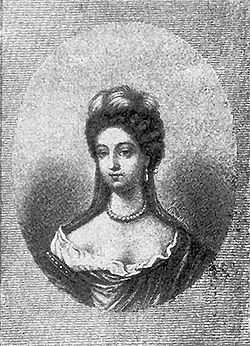Maria Aurora of Spiegel

Maria Aurora of Spiegel, born Fatima (fl 1733), was a mistress of Augustus II the Strong and the wife of a Polish noble. Originally a Turkish slave, she was brought to the royal courts of Sweden and Poland from Buda and trained as a lady-in-waiting.
During the Imperial "reconquest" of Buda from the Ottoman Empire in 1686, soldiers of the Imperial army took the slaves and property belonging to the Turks. The Swedish baron Alexander Erskin, then in Austrian service, took four women: Raziye (Roosia); Asiye (Eisia); Emine; and Fatma (Fatima). Fatima claimed to have been the wife of a mullah (a Muslim clergyman). Baron Erskin returned to Sweden with Philip Christoph von Königsmarck, and gave Fatima to Philip's sister Maria Aurora of Königsmarck. The four women were baptised in Stockholm on 7 November 1686 in the presence of the royal court. Crown Prince Charles and Aurora of Königsmarck stood as Fatima's godparents, and she was christened Maria Aurora after Maria Aurora of Königsmarck.
She was taught etiquette and French and became a well-liked companion to Aurora of Königsmarck. In 1691 she followed her mistress to Saxony and Poland, where Aurora of Königsmarck became the royal mistress of King Augustus. She was often present at Augustus' visits to Königsmarck, and in 1701 she replaced Aurora as the royal mistress. Augustus married her to his ennobled servant Spiegel. Augustus acknowledged his children with her and seemed to have been in love with her. He often returned to her between his other relationships, and she herself is said to have been tolerant of this, supposedly because she was brought up in a harem. She was the mother of Frederick Augustus Rutowsky and Maria Anna Katharina Rutowska. She later divorced Spiegel and married a Frenchman in Saxon service, Count Claude de Bellegarde
She continued as a central character within the royal court after her relationship with Augustus ended, and was good friends with the influential Przebendowska, a relation to the favourite count Fleming. At the king's death in 1733, she was given an allowance of 8.000 thaler in his will.
References
- (Swedish) Personhistorisk tidskrift / Första årgången 1898-99 /
- (German) http://www.beautifulnetwork.de/august/seiten/maetressen/fatima.html (with image)
Literature
- Vehse: Geschichte der Deutschen Höfe del 32, Georg Ludvig von Haxthausen.